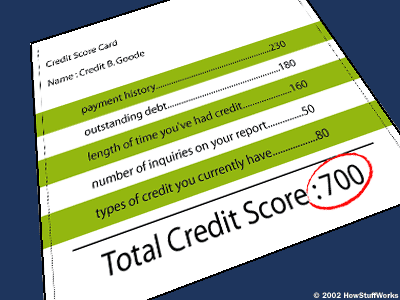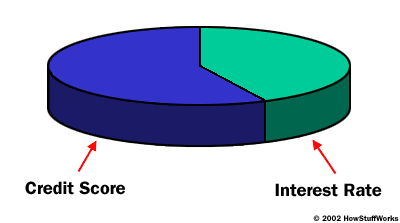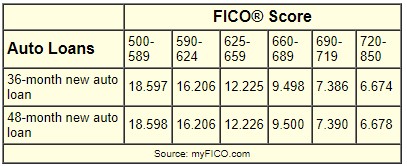How Credit Scores Work
by Lee Ann ObringerIntroduction
We apply for credit for many reasons -- maybe it's to buy a new car, house, computer, or get a student loan. Did you know, however, that there is a special number that can determine whether you can do these things, or at least how much it will cost you? Your credit score is a three-digit number that can do just that.
How can a single number be meaningful enough to determine whether you can buy a house or car? A credit report contains a history of how you've paid your bills, how much open credit you have, and anything else that would affect your creditworthiness. Your credit score boils down all of that information into a three-digit number.
In this article, we'll find out how this formerly secret number is used and how it affects how much you pay for credit, insurance and other life necessities.
What is a Credit Score?
A credit score is a number that is calculated based on your credit history to give lenders a simpler "lend/don't lend" answer for people who are applying for credit or loans. This number helps the lender identify the level of risk they may be taking if they lend to someone. While the same end result can come through reviewing the actual credit report (which lenders usually do), the credit score is quicker and less subjective.
The system awards points based on information in the credit report, and the resulting score is compared to that of other consumers with similar profiles. With this information, lenders can predict how likely someone is to repay a loan and make payments on time. It's the credit score that makes it possible to get instant credit at places like electronics stores and department stores.
Although there are several scoring methods, the score most commonly used by lenders is known as a FICO because of its origins with Fair Isaac and Company . Fair Isaac is an independent company that came up with the scoring method and software used by banks and lenders, insurers and other businesses. Each of the three major credit bureaus (Experian, Equifax and TransUnion) worked with Fair Isaac in the early 1980's to come up with the scoring method.
The three national credit bureaus each have their own version of the FICO score with their own names. Equifax has the Beacon system, TransUnion has the Empirica system, and Experian has the Experian/Fair Isaac system. Each is based on the original Fair Isaac FICO scoring method and produces equivalent numerical results for any given credit report. Some lenders also have their own scoring methods. Other scoring methods may include information such as your income or how long you've been at the same job.
Calculating the Score
Think of your credit score like you would a grade in school. A teacher calculates grades by taking scores from tests, homework, attendance and anything else they want to use, weighting each one according to importance in order to come up with a final single number (or letter) score. Your credit score is calculated in a very similar manner. Instead of using the scores from pop quizzes and reports you wrote, it uses the information in your credit report.
The number itself can range from 300 to 900. The formula for exactly how the score is calculated is proprietary information and owned by Fair Isaac. Here, however, is an approximate breakdown of how it is determined:
- 35% of the score is based on your payment history. This makes sense since one of the primary reasons a lender wants to see the score is to find out if (and how timely) you pay your bills. The score is affected by how many bills have been paid late, how many were sent out for collection, any bankruptcies, etc. When these things happened also comes into play. The more recent, the worse it will be for your overall score.
- 30% of the score is based on outstanding debt. How much do you owe on car or home loans? How many credit cards do you have that are at their credit limits? The more cards you have at their limits, the lower your score will be. The rule of thumb is to keep your card balances at 25% or less of their limits.
- 15% of the score is based on the length of time you've had credit. The longer you've had established credit, the better it is for your overall credit score. Why? Because more information about your past payment history gives a more accurate prediction of your future actions.
- 10% of the score is based on the number of inquiries on your report. If you've applied for a lot of credit cards or loans, you will have a lot of inquiries on your credit report. These are bad for your score because they indicate that you may be in some kind of financial trouble or may be taking on a lot of debt (even if you haven't used the cards or gotten the loans). The more recent these inquiries are, the worse for your credit score. FICO scores only count inquiries from the past year.
- 10% of the score is based on the types of credit you currently have. The number of loans and available credit from credit cards you have makes a difference. There is no magic number or combination of types of accounts that you shouldn't have. These actually come more into play if there isn't as much other information on your credit report on which to base the score.

This information is compared to the credit performance of other consumers with similar histories and profiles.
Your Score Affects...
Your credit score doesn't just affect whether or not you get a loan; it also affects how much that loan is going to cost you. As your credit score increases, your credit risk decreases. This means your interest rate decreases.

This chart shows an example of how interest rates for a car loan can vary based on your credit score:

There are other factors that influence the interest rate you get for a loan besides your credit score. Things like the type of property you are using the loan to buy, how much of your own money (equity) is going into it, the costs the lender has to make the loan, etc.
Who else uses credit scores?
In addition to banks and lenders, there are landlords, merchants, employers and insurance companies jumping on the credit score bandwagon. Of all of these, the fact that insurance rates are being determined by credit scores is causing consumers the most alarm. To most, it seems that your credit history and your driving record have little in common. Insurers, on the other hand, have found that using credit scores to predict how likely someone is to pay premiums has helped them cut their losses. They don't use the same score that banks and lenders use, however. They use a slightly different formula for their calculations and actually call it an "insurance score."
Insurers' use of credit histories to determine rates is under scrutiny nationwide. Many states are passing laws restricting this practice. Washington, Utah, Idaho and Maryland have already done so, and 20 more states are considering it. Check your state’s department of insurance Web site to see where your state stands on the issue.
How Credit Scores Work, Retrieved February 16, 2006, from How Stuff Works.com: http://money.howstuffworks.com/credit-score.htm